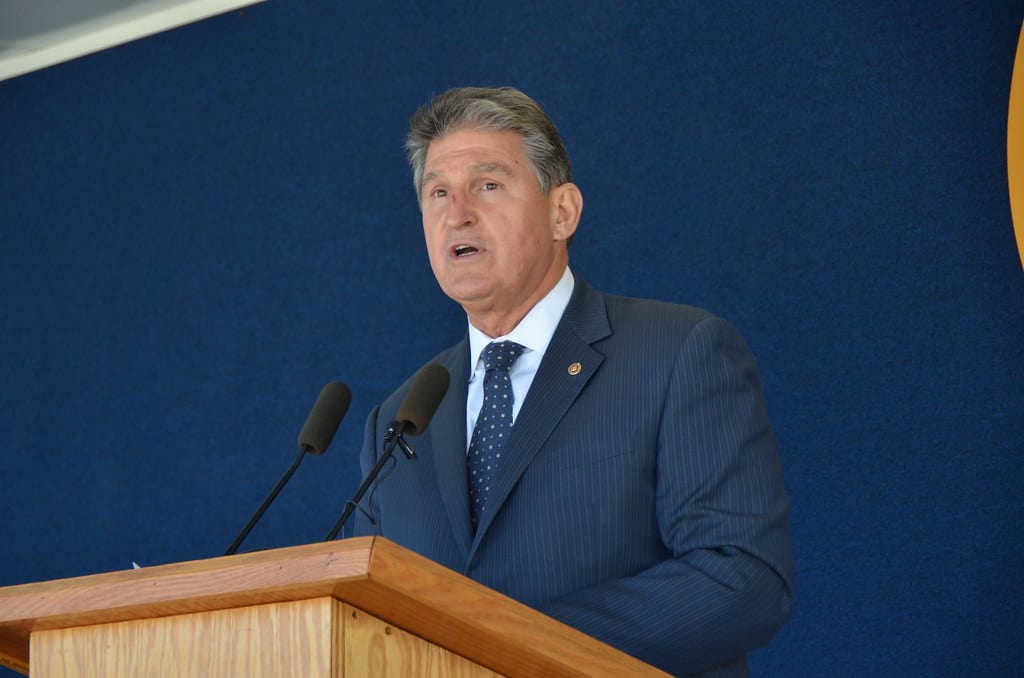
Profile in Courage: Sen. Joe Manchin III (D-W.Va.)
Ross Marchand
February 26, 2021
In today’s hyper charged political environment, it’s almost unheard-of for a prominent politician to regularly take on his or her own party. Yet, Sen. Joe Manchin (D-W.V.) does it every day, placing a higher value on pursuing sound public policies rather than toeing the party line. In defying the Democratic disposition toward onerous regulations and high minimum wages, Sen. Manchin has made plenty of enemies during his time in Washington, D.C. But he’s also no Republican in disguise and has challenged GOP lawmakers to defy partisanship and work together on key pressing issues. Too often, policymakers will trade in their independent thinking for brazen self-interest once they become powerful enough. But even as “the most powerful man in Washington,” Sen. Manchin sticks to his guns and demands the very best of both parties. And for rising above the fray even when the going gets rough, Sen. Joe Manchin is a Profile in Courage.
Sen. Manchin had a decidedly modest upbringing. It was a world apart from the Washington, DC politics he is now a part of. Manchin was born in the small mining town of Farmington, West Virginia to carpet and furniture store owner John Manchin. Both Joe’s father and grandfather had served as mayor of Farmington, but the now-senator set his ambitions even higher than his forebears. At the age of 35, Manchin became a West Virginia state delegate. Four years later he became a state senator, and Manchin’s star power grew considerably in his ten years serving West Virgina’s 13th and 14th districts.
Following in the footsteps of his uncle A. James Manchin, Manchin was elected West Virginia’s secretary of state in 2000. But, the now-senator wanted to lead his state in a different way and announced in 2004 that he would challenge Democratic incumbent Bob Wise in the upcoming gubernatorial election. Wise opted to leave the public eye following a scandal, creating a wide opening for Manchin to win the election by a nearly-thirty percentage point margin. As West Virginia’s chief executive from 2005 to 2010, Manchin faced no shortage of issues. Coal production and consumption was beginning to peak, spelling trouble for the state’s finances. And starting around the middle of his tenure, a large recession reared its ugly head. Despite these issues, Manchin maintained a steady hand and helped keep state revenues high relative to expenses. During his tenure, the ratio of long-term liabilities to assets also shrank as the state improved its fiscal footing.
After a successful stint in Charleston, Manchin set his sights on Washington, D.C. Following the death of then-Senator Robert Byrd in 2010, Manchin successfully ran to fill Byrd’s two remaining years. He was elected by more than a 10-percent margin in a reliably Republican state, a testament to his ability to meet the other side in the middle and talk to – not alienate – his political opponents. Sen. Manchin has now been in office for more than a decade, focusing on issues such as energy policy and regulatory and spending reform. But for the first time since assuming office, he finds himself in the unusual position of being the most powerful man in Washington, D.C. The Senate is now gridlocked 50-50, making Sen. Manchin the swing vote for a wide array of legislation.
During this uber-divided time, pundits and fellow lawmakers seem perplexed by the powerful lawmaker’s reluctance to toe the party line. In reality, the lawmaker has the simple and straightforward aim of making the governing process open to all parties . This principle of inclusivity has led him to oppose doing away with the filibuster, a tool which has historically helped minority parties retain a governing foothold. When asked by Fox News reporter Bret Baier whether he would vote to nix the filibuster, Sen. Manchin responded with an emphatic no and claimed there were fellow Democrats who also recognize the importance of protecting parties out of power.
Sen. Manchin has also used his clout to oppose increases to the federal minimum wage. Sen. Manchin rightly recognizes that this policy would be catastrophic for working-class Americans trying to climb up the economic ladder. According to an analysis by the Employment Policies Institute, West Virginia alone “can expect to lose as many as 12,331 jobs [if the minimum wage were raised to $15/hour]…The restaurant and bar industry will account for 38% of total job losses, and 29% of lost jobs will be those held by tipped workers.”
Sen. Manchin doesn’t always vote in the best interests of taxpayers and consumers. But he’s at least open-minded enough to hear the other side out, and brave enough to take on his party’s economic orthodoxy. And for taking the high road at such a dark, difficult time, Sen, Joe Manchin is absolutely a Profile in Courage.
